The legacy of The Beatles is completely intertwined in the fabric of music today, not only due to their groundbreaking sound, but also due to the way that they redefined what a band was. Although their impact still resonates throughout pop and rock today, it is interesting to consider that their spectacular ascension took place during an entirely different period, one of physical media like CD, cassette, and vinyl, and fostered by radio, not algorithms.
They achieved this during an era when albums were to be listened to in toto from beginning to end, and each release was an event. With more than 600 million records sold globally, they not only topped charts but redefined them. Their studio gambles as artists, from unorthodox song structures to experimental recording methods, pushed music to new frontiers.
Artists today can pursue viral singles and streaming figures, but The Beatles established their legacy in a slower, analog age, one where cultural longevity was more important than a position on a playlist.
Even in the era of today's rapid-fire, digital-first music culture, The Beatles remain an imposing force, always attracting fresh waves of listeners via streaming sites. Their record, decades since its initial release, still commands eye-popping figures, with most songs in the hundreds of millions, some pushing past the billion-stream threshold.
Far from declining into nostalgia, their music flourishes on playlists, algorithms, and social media trends, demonstrating that their creativity and songwriting are as relevant today as they were in the 1960s. The durability of their influence in an age of short-form content and constantly changing musical trends is a testament to the timelessness of their work and its universality.
Disclaimer: This article contains the writer's opinion. The reader's discretion is advised!
Here are the top 10 The Beatles' songs that still rule the stage
These are the 10 greatest The Beatles tracks that still dominate on stage, both because they remain forever popular and also because of the strength, passion, and timeless popularity they still garner from live performance.
Decades since they were launched, songs like Let It Be, While My Guitar Gently Weeps, and Come Together still move generations of listeners, sung either by Paul McCartney himself, reinterpreted by contemporary artists, or recreated in tribute performances.
The songs have entered the lexicon of world songs, evoking all the feelings from euphoria to introspection. Their harmonies are carved, their lyrics still sing, and their legacy speaks across cultures and genres.
Wherever the platform, whenever the era, these Beatles classics deserve notice, not as relics of earlier eras, but as vibrant, pulsating witnesses to the band's immeasurable stamp on the history of music.
1) Hey Jude
Hey Jude is one of The Beatles' finest, emotionally charged and universally appealing songs, not only for their musical genius, but for the human warmth of its origin. Written by Paul McCartney in 1968 as a comfort to young Julian Lennon dealing with his parents' divorce, the song went beyond its origin as a personal gesture to become an international anthem of hope and reassurance.
Contrary to most Beatles love songs based on romantic love, Hey Jude is a song of sympathy and encouragement, and the emotional richness of the band during a time of crisis in their career.
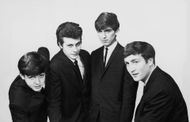
It's a plain piano melody that grows into a soaring crescendo, ending in a notoriously extended, sing-along finale that has brought generations of people together at live shows and parties. Aside from its raw commercial success, hundreds of millions of streams, and decades of rotation, the cultural shelf life of the song is that it is timeless.
It's a song that addresses anyone suffering, kindly instructing them to "take a sad song and make it better." Few have left such indelible marks on the social consciousness as has Hey Jude, which remains today a symbol of comfort, solidarity, and immortal writing.
Read More: 10 Freddie Mercury tracks that still set the stage on fire
2) Here Comes the Sun
Here Comes the Sun (1969) from The Beatles' album Abbey Road is George Harrison's present for making everyday moments into universal affirmations of hope. Composed in a temporary respite from The Beatles' business stress, while lounging in Eric Clapton's garden, the song records the calming pleasure of spring's return. It is a spring anthem. However, the song is also a soft exhalation of relief, a private message to oneself that even darkest times yield to light.
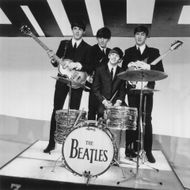
Its acoustic warmth, sharp guitar licks, and authentic lyrics have allowed it to remain relevant throughout the centuries, featured in innumerable movies, TV dramas, and private playlists. Well over a century after it was first performed, the song still touches deeply among its fans, representing survival and emotional renewal.
In May 2023, it became history's first Beatles track to have registered over one billion streams on Spotify, a breathtaking feat that not only indicates its popularity but also the lasting comfort it provides in an increasingly searching world for light after darkness.
Read More: 8 Post Malone songs that defined a generation
3) Something
With Something (1969), George Harrison finally emerged from the long shadow of Lennon and McCartney to present one of the most time-tested and loveliest love ballads in The Beatles' repertoire. Issued as part of the Abbey Road album, the song was Harrison's standard by which he measured himself, not just as a guitarist, but as a peer singer-songwriter to his seniors.
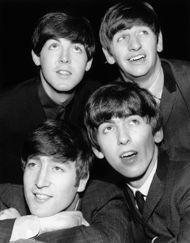
Where other similar songs strive for greatness, Something expresses its feeling in simple tenderness and lyrical subtlety. Harrison's unobtrusive singing gives the song a human, personal touch. It's subdued guitar solo is one of the greatest ever in rock music, not as a display of technical proficiency but as a display of emotional force.
Contrary to the rest of The Beatles' albums, this one didn't just coast on the group's heritage but reimagined it gracefully, proving Harrison's understated complexity and uncompromised sensibility. At a literal level, Something was as much a love song as it was Harrison's unassuming confirmation that his musical voice was not any more auxiliary, but central to the brilliance of the group.
4) Help!
Released in 1965 as a lead single and title song for The Beatles' fifth album and second motion picture, Help! documents a pivotal juncture in the band's artistic evolution and John Lennon's life. While the song's fast pace and catchy tune imply lightweight pop, its essence betrays something more intimate, Lennon's raw acknowledgement of inner conflict in the dizzying peaks of Beatlemania.

Looking back, Lennon wrote it not as a typical hit single, but as an honest cry for emotional help at a time of covert crisis. Most noteworthy about Help! is the juxtaposition between its hyperkinetic arrangement, fuelled by jagged guitar figures and tautly arranged harmonies, and the aching poignancy lurking below.
It's a record that, although ideally suited for the charts, foreshadowed the band's transition from lighthearted rock 'n' roll heroes to more introspective, mature songwriters. Years later, Help! remains relevant, appearing often on greatest hits compilations and inciting debate among fans for its lyrical honesty and timeless pop craftsmanship.
5) Blackbird
Blackbird, arguably the quietest track on The Beatles' 1968 White Album, has resonated across generations for its soothing sound and deeper meaning. Paul McCartney penned the tune most straightforwardly, merely his voice and acoustic guitar, but even in that straightforwardness lies great emotional weight.
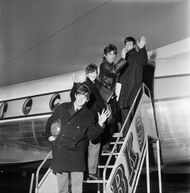
Anything but a gentle ballad, Blackbird is message-based in the context of the American civil rights movement of the 1960s, with the titular bird representing those fighting for equality and justice in America. Rather than outright protest, McCartney used subtlety, using poetic metaphor to speak of struggle, freedom, and inner strength.
Its enduring popularity, as conveyed by over 550 million streams, stems not merely from its sweet arrangement but from the underlying desperation that fueled it, always remembering that the quietest of songs can conceal the greatest truth.
6) Twist and Shout
Twist and Shout is one of the most explosive examples of The Beatles in their early heyday, a record that captures the raw energy of a young band in ascension. Although the Top Notes had already recorded the song and the Isley Brothers made it a hit before them, The Beatles later made it all their own in 1963 with an almost manic energy that differentiated them.
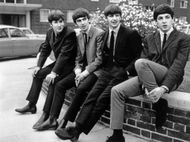
John Lennon's raw, strained vocals, recorded at the end of an exhausting studio session, added a rawness to the song that couldn't be practiced or reproduced. That live imperfection is precisely what made it legendary.
With more than 579 million streams to date, the song still resonates as a testament to their early toughness and charm, evidence that sometimes, the most memorable performances are based on raw adrenaline and feeling, not sheen.
7) Yesterday
Few records on contemporary music have come as close to achieving the classic status and emotional resonance of The Beatles' Yesterday from their album Help! (1965). Composed and sung by Paul McCartney, the song was born of a dream as McCartney woke up with the mournful melody stuck in his head, not knowing initially if he had unwittingly remembered a song.
Which was followed by a lesson in restraint: a minimalist arrangement using only acoustic guitar and string quartet, where the song's painful quality of nostalgia and personal loss could take center stage. Yesterday doesn't need big production or sweeping gestures; its strength is vulnerability and melodic purity. Its timeless themes of regret and passing time have endured for generations, making it the most covered song in history with more than 743 million streams and countless covers.
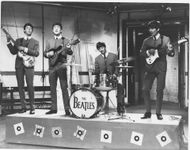
Aside from its financial success, Yesterday is frequently celebrated by both critics and fans as not only one of The Beatles' best moments, but as one of the most exquisitely written ballads in pop music history, a soft, long-lasting reminder that sometimes less really can be more.
8) Come Together
Come Together (1969) is an anomaly among The Beatles' most experimental departures from what they had done before, a representation of how much further than they were prepared to push the limits of their music in the Abbey Road album. The song was originally composed by John Lennon as a campaign slogan for Timothy Leary's presidential election campaign, and the track ended up becoming a lot more obscure and enduring.
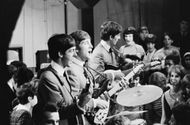
Laid over the laid-back groovin' and dripping with attitude, it introduced a funkier, darker attitude to the band's catalog, showing that rock could be taken from raw, nigh-psychedelic power. John Lennon's gravelly, strident vocals, Ringo Starr's relentless drumming, and Paul McCartney's smooth-as-silk bass line created a hypnotic groove that gave the song its signature beat.
George Harrison's less-than-sufficiently-revered but indispensable guitar fill added another layer of mystery, grounding an aural universe that remains unsettling to today's listener.
With over 800 million streams, Come Together isn't merely one of Abbey Road's highlights. It's been one of the greatest final-period Beatles songs and a standard by which their development from pop idols to rock-era genre-benders has been measured for decades.
9) A Day in the Life
A Day in the Life (1967) from the album Sgt. Pepper's Lonely Hearts Club is where The Beatles are most experimental and creative. Lennon and McCartney demonstrate that they can reverse musical convention and still manage to produce something deeply compelling. Instead of following the standard pop song structure, the song unfolds as a dreamlike scenario, disjointed, orchestral, and emotionally intense.

It brings together John Lennon's ethereal sorrow and McCartney's bright break, creating an otherworldly but compelling contrast that stretched the possibilities of what a rock song might accomplish in the late '60s.
The dissonant orchestral climaxes and sudden mood changes make it the most experimental recording by the band. Whereas its unorthodox structure repelled some people when it first came out, it has since been embraced by all as a landmark in musical history.
A Day in the Life not only differs from other Beatles tunes by a significant margin, but it also reshaped popular music at the time of what was possible.
10) Strawberry Fields Forever
Strawberry Fields Forever can be the ultimate example of the self-analytical brilliance of John Lennon at a period when The Beatles were taking their music further than ever. Though it was recorded as Sgt. Pepper's Lonely Hearts Club Band was being made, the song came out as a standalone single, an early precursor to pop records since it was not part of an album.
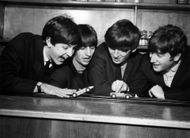
Recorded on a surreal piece awash in avant-garde production techniques, reverse tape loops, and Mellotron textures, the song takes listeners to a surreal, quasi-space world. Far from the literal description of childhood, Lennon conflates memory and fantasy to create an exploration of identity and perception that is deeply personal but completely universal.
Following along the same wave of creative excitement that had driven Revolver and Pepper, Strawberry Fields Forever was not just another chapter in The Beatles' book. It was a perfecting of what could be done in a pop record, balancing fragility and experimentation along a tightrope that is still revolutionary.
The Beatles' catalog is the most inventive and innovative music ever made. They can play around with other genres, bend songcraft rules, and find the human aspect in their music that no other band of their time could. From their hook-heavy pop early releases to their later experimental ones in which they approached more mature themes and complex forms, the Beatles never stopped shattering the barriers of their music, reshaping the faces of modern music.
All the tunes, be it cheerful or depressing, reflect the way they, as artists, developed and tried to connect with other people on a universal level. Even years after they've passed on, the effects of their music are embedded, shaping artists and music fans generation upon generation around the globe. The Beatles' work is not a list of tracks, it's a collection of cultural heritage that keeps crossing boundaries and timelines.
Keep reading SoapCentral for more informative content!
Also Read: A look at the history of the Drake-Kendrick Lamar beef
